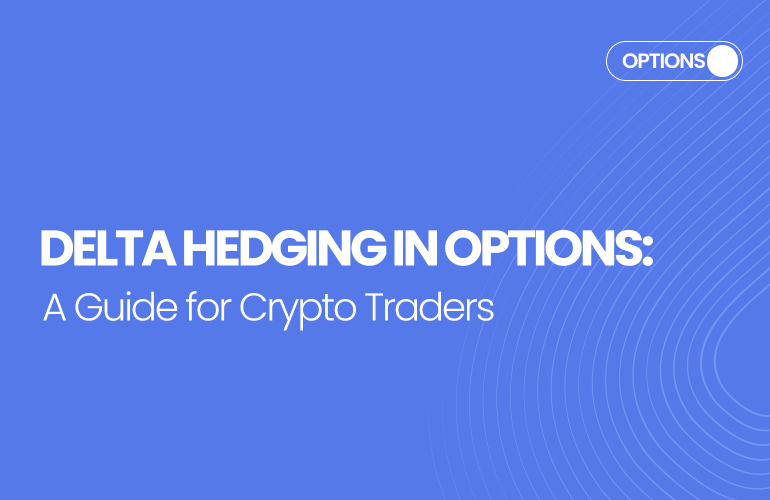Key Takeaways
- Delta measures your exposure to price changes in the underlying asset.
- Dynamic delta hedging in options helps neutralize that exposure, locking in strategy-based returns.
- Hedging involves adjusting spot/futures positions based on the delta of your options.
- While effective, it requires active monitoring and cost management.
- Pi42 provides trader-friendly tools to automate and simplify delta risk management.
Options trading offers unmatched flexibility, but also introduces complex risk dynamics. One of the most important risks to manage is delta, or directional exposure.
Enter dynamic delta hedging, a strategy used by professional options traders to neutralize portfolio risk as market prices shift. For crypto traders dealing with volatile assets like BTC or ETH, delta hedging in options can mean the difference between steady profits and sudden losses.
In this article, we’ll break down what dynamic delta hedging in options is, how it works, and how you can use it to fine-tune your crypto options strategy.
What Is Delta in Options?
Options delta meaning: Delta measures how much an option’s price moves for a $1 change in the underlying asset.
It ranges between 0 and 1 for calls, and -1 to 0 for puts.
A BTC call with delta 0.6 means the option price will move $0.60 for every $1 change in BTC.
Why Delta Matters
If you hold options with a combined delta of 0.4, your portfolio behaves like owning 0.4 BTC. If BTC drops, so does your P&L, unless you hedge. This is where option trading delta becomes essential for professional portfolio management.
What Is Dynamic Delta Hedging?
Dynamic delta hedging means constantly adjusting your hedge (usually spot or futures) to keep your portfolio delta-neutral as market conditions and Greeks change.
It’s called “dynamic” because:
- Delta changes with time (theta decay)
- Delta changes as underlying price moves (gamma effect)
Therefore, your hedge must be updated regularly.
Delta-Neutral Position
When a position is delta-neutral:
- It is unaffected by small price moves in the underlying
- Instead, your P&L depends on time decay (theta), volatility (vega), and gamma
How to Implement Dynamic Delta Hedging in Crypto
- Calculate Total Delta
- Use an options calculator or platform like Pi42 to get delta for each leg
- Sum deltas to find net portfolio delta
- Offset With Spot or Futures
- If net delta = +0.5 BTC, short 0.5 BTC on the spot or futures market
- If net delta = -1.2 BTC, go long 1.2 BTC
- Rebalance Regularly
- Delta changes constantly due to gamma and underlying movement
- Set a time-based (e.g. every hour) or threshold-based (e.g. delta changes by 0.1) rebalance rule
- Monitor Costs
- Each rebalance can incur trading fees and slippage—factor that into profitability
Example: Delta Hedging a Crypto Call Spread
Suppose you sell a BTC call spread:
- Short $65K Call (delta = -0.4)
- Long $60K Call (delta = +0.6)
Net Delta = +0.2
You hedge by shorting 0.2 BTC in the spot or futures market.
If BTC rises and delta increases to 0.4:
You now need to short an additional 0.2 BTC to stay delta-neutral.
Delta hedge put option strategies can also be applied in a similar way. For instance, a delta hedging put option example would involve balancing short puts with long futures or spot buys to maintain neutrality.
Advantages of Dynamic Delta Hedging
Risk Management
Protects your portfolio from adverse price moves while keeping you exposed to:
- Volatility changes (vega)
- Time decay (theta)
Profit Stabilisation
Reduces directional noise, allowing your option strategy (e.g., iron condors or butterflies) to work based on time and volatility rather than trend.
Institutional-Grade Practice
Used by market makers, prop desks, and funds to maintain risk-neutral books in volatile markets like crypto.
Challenges & Tips for Crypto Traders
| Challenge | Solution | ||
|---|---|---|---|
| Frequent rebalancing = higher cost | Use threshold-based triggers | ||
| Market moves too fast | Use limit orders for hedges | ||
| Poor liquidity in altcoins | Hedge only with top liquid assets (BTC/ETH) | ||
| Funding fees on futures | Use spot for short-term hedging or platforms with low/no fees |
Tool for Delta Hedging on Pi42
- Live Delta Monitor: See real-time delta of your open positions
- Options Wizard (coming soon): Plan trades with P&L + delta visualization
- Hedging Assistant: One-tap execution of delta hedging in options using spot or perpetual futures
Conclusion
Delta hedging in options isn’t just for institutions—it’s a key skill for serious crypto options traders. With dynamic delta hedging, you gain the ability to neutralize direction, focus on volatility or time decay, and manage options portfolios more professionally.
Start tracking and hedging your crypto options delta with Pi42 today.
Our tools are built to help you trade like a pro—even in the most volatile markets.
Read Related:
Option Greeks Explained: Delta, Gamma, Theta, Vega, Rho
Understanding Crypto Options Liquidity and Slippage: Orderbooks Explained
What Are Altcoins: Understanding Their Importance and Impact
How to Trade in Cryptocurrency in India and Actually Make Profit

